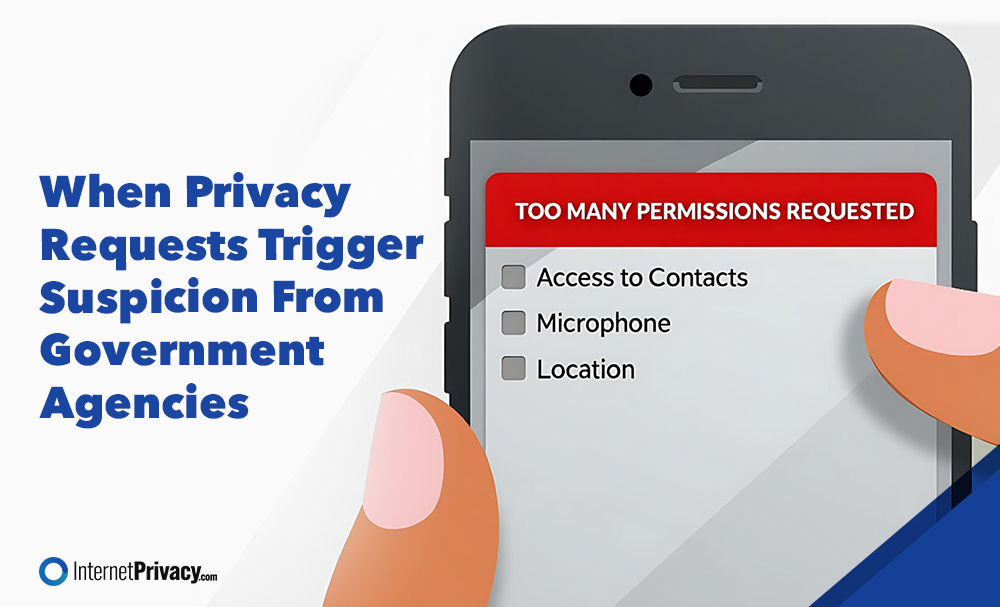When Privacy Requests Trigger Suspicion From Government Agencies

Not all privacy requests are treated equally. If your request raises concerns, government agencies may delay or deny it, or even open an investigation. Knowing what triggers suspicion and how to avoid those flags can help you stay compliant and protect your rights.
Understanding Privacy Requests
A privacy request allows you to access records about yourself that federal agencies hold. These requests fall under the Privacy Act and, in some cases, the Freedom of Information Act (FOIA). Each request must be submitted with care to avoid delays or suspicion.
Under the Privacy Act:
- You can request access only to records that are part of a “system of records”—meaning files that are retrievable by your name or another personal identifier.
- You must provide sufficient detail to identify the specific system and record you’re requesting.
- Only the individual the record is about—or a legal guardian with valid consent—can request access.
- Requests must include a specific description of the records sought, along with any relevant time frame, to enable a reasonable search effort by the agency.
What Are Government Agencies Looking For?
Federal agencies are required to protect the information they hold. When they receive a Privacy Act request, they verify that the request is legitimate, the identity is verified, and that the records fall under the appropriate system.
Agencies may grow suspicious if:
- The request is vague or incomplete.
- It comes from someone claiming to represent another person without valid proof.
- The documentation doesn’t match agency records.
They also pay close attention to requests involving:
- Individuals with past legal or immigration issues.
- Requests from third parties without notarized consent.
- Cases involving national security or public safety.
- Requests that lack a detailed explanation or appear to be fishing for information beyond the scope of the specific system.
Common Red Flags That Trigger Scrutiny
- Inconsistent or Missing Information
- Providing an incorrect current address, failing to include a personal identifier, or omitting a statement signed under penalty of perjury will likely delay your request.
- If you’re using mail, ensure your postal mailing address is up to date and clearly listed.
- Omitting required verification documents, such as a valid photo ID or driver’s license, may result in additional verification steps.
- Requests on Behalf of Others Without Proper Consent
- Only the individual to whom the record pertains can submit a request.
- Suppose you are a legal guardian consenting on behalf of a minor or a legally incompetent person. In that case, you must include a notarized statement and documentation proving your authority to act on their behalf.
- Requests from legal guardians for consent require clear authorization to avoid denial or further inquiries.
- Suspicious Backgrounds or Affiliations
- If you’re a legal permanent resident or lawfully admitted, agencies may check your immigration status against other systems.
- Past criminal offenses or connections to flagged entities may prompt a more thorough review.
- Requests from individuals with inconsistent or unverifiable information may be flagged for investigation.
- Repeated or Vague Requests
- Repeatedly requesting access to duplicate records without adding new details can appear to be harassment or misuse of the process.
- Always be specific. Reference the system ID, include a detailed description of the record, and state the time frame you’re looking for.
- Requests lacking a specific system or records notice often lead to delays or denials.
What Can Happen If Your Request Is Flagged
- Extra Verification and Delays
- You may be asked to submit further information to verify your identity, such as a photo ID or driver’s license.
- The agency might contact the system manager to review your file more closely.
- Processing times may be extended while agencies conduct due diligence.
- Denial of the Request
- If the agency cannot verify you or your legal authority, your request may be denied.
- Denials may also occur if they suspect the request is being made under pretenses.
- Requests that do not meet the criteria of a privacy act system or lack sufficient detail may be rejected.
- Investigation or Legal Review
- In rare cases, suspicious activity can trigger an internal review or even a court order.
- Submitting false information or misusing privacy requests could be treated as a criminal offense.
- Agencies take misuse seriously to protect both individuals’ privacy and the integrity of federal records.
How to Avoid Suspicion When Making a Privacy Act Request
- Be Accurate and Honest
- Include your full name, date of birth, employee identification number (if applicable), current address, and telephone number.
- Sign your request with an unsworn declaration under penalty of perjury.
- Provide a specific description of the records you seek and the applicable system of records notice.
- Verify Identity
- Attach a valid form of photo ID, such as a driver’s license or passport.
- Use certified mail when submitting postal mail requests to track delivery.
- Include any additional verification documents required by the agency.
- Include Specific Details
- Identify the applicable system of records by name or system ID.
- Use a records notice or system manager directory to match your request to the correct file.
- Provide detailed information, including time frames, types of records, and any other relevant identifiers.
- Provide Legal Authorization When Needed
- If acting as a legal guardian or for someone legally incompetent, include documents authorizing disclosure and a notarized statement.
- Ensure you provide consent in a valid form that meets agency requirements.
- Know Your Rights
- You can appeal a denied request or request notification of changes to your privacy act records.
- The law permits statements of disagreement to be added to your file if the records are incorrect.
- Understand the time frame for agency responses and the procedures for follow-up.
Are There Alternatives to Filing a Privacy Request?
Sometimes you don’t need to file a formal Privacy Act request. Other options include:
- FOIA Requests
- If the information isn’t personal or is related to general agency policies, it may fall under the Freedom of Information Act.
- Using Encryption or Data Management Tools
- Tools that anonymize or encrypt your information can reduce your exposure to data breaches and limit what government systems track.
- Third-Party Services
- Some organizations help manage records and assist with submitting accurate and compliant requests.
Final Thoughts
Privacy requests help protect your personal information. But getting them wrong can raise red flags. By submitting clear, consistent, and accurate information and adhering to the Privacy Act rules, you minimize the risk of delay, denial, or investigation.
If you’re unsure, consult with legal help or the agency’s website for guidance before submitting your request.





